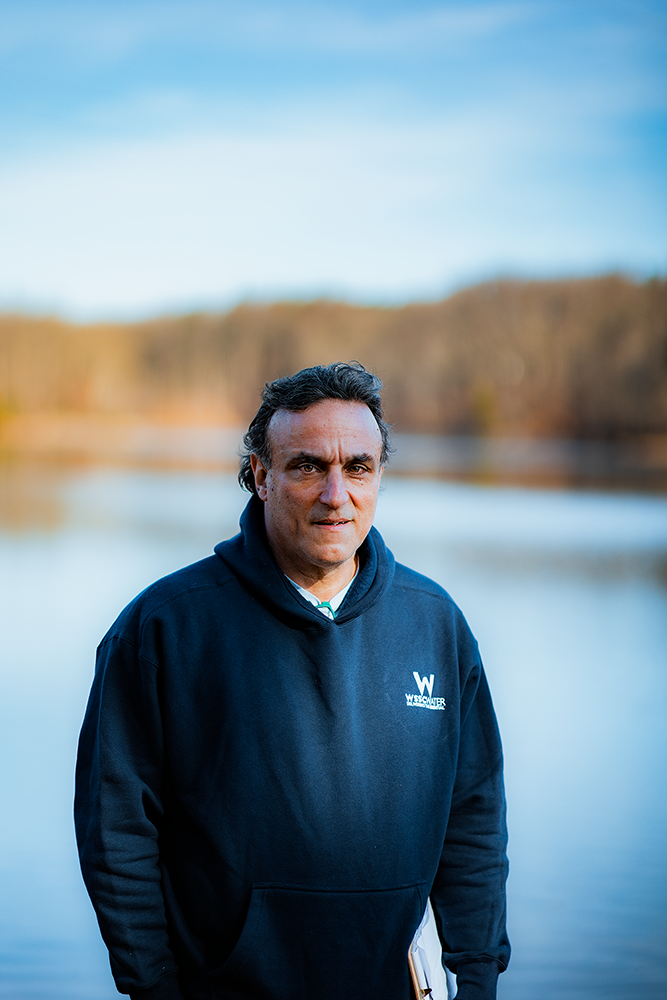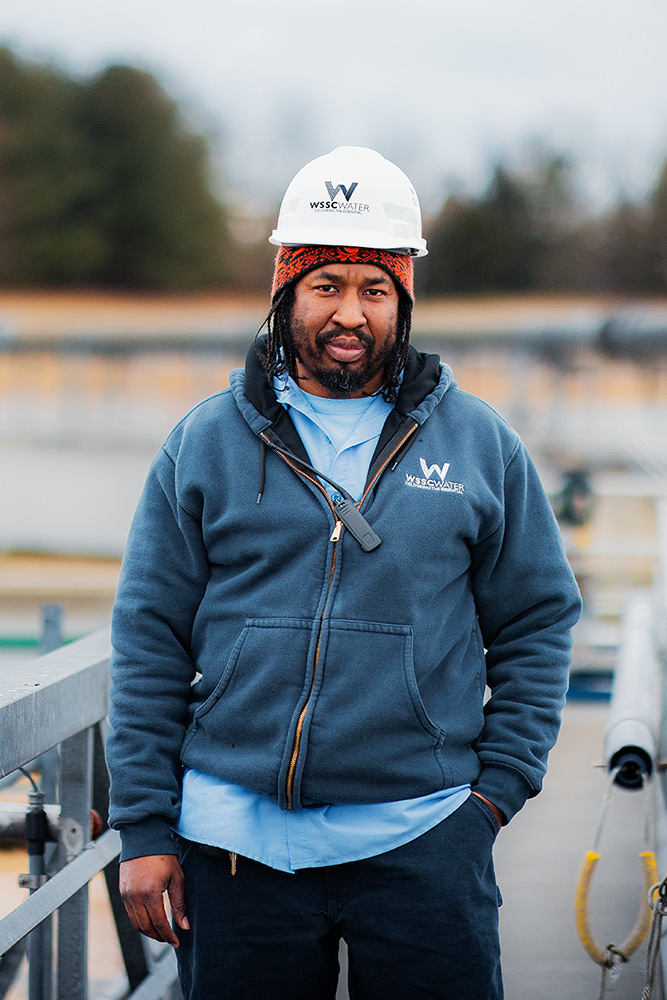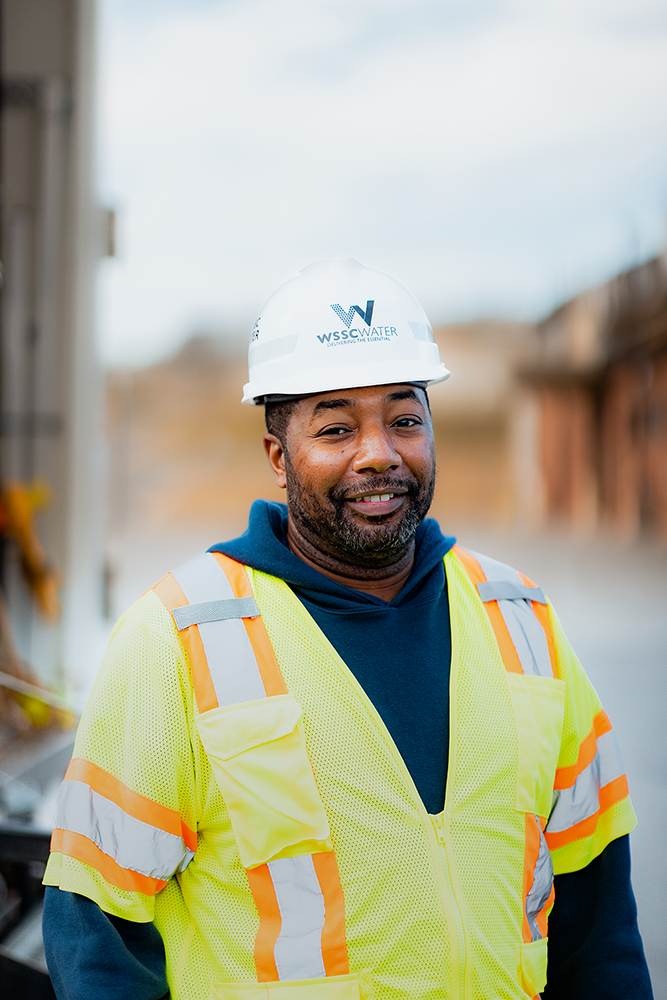From Source to Tap: The People Behind our Safe Water
FY22 Water Quality Report Biographies
FY22 Water Quality Report Biographies
Jeff Bell | Anthony Bellamy | Sade Dunnock | Jeff Kucher | Dalmar Rushing | Priscilla To

When you own 6,000 acres of the watershed surrounding your source water, plenty of work goes into protecting and maintaining that land, especially when everything on it affects the water.
Jeff Bell is one of several employees at Brighton Dam who manage the Triadelphia and Duckett reservoirs watershed. However, his title of maintenance mechanic belies the extent of his responsibilities. While he repairs lawnmowers and equipment - “we have 54 miles of access road to maintain,” he says – he’s also a keeper of fish, bees, chestnut trees and hiking trails.
“We have an agreement with the State of Maryland where, because we block the river [to create Brighton Dam], we have to maintain fish life,” says Jeff. Working with the state’s Department of Natural Resources, he maintains the fish population by raising “fry” or baby fish in WSSC Water’s fish nursery pond.
Once grown, the big fish go into the reservoir, and Jeff keeps the brood stock to hatch more fry. Ultimately, the reservoir is home to white perch, northern pike, bass, tiger muskies, walleye and crappie.
The honeybees he “keeps” are part of a program WSSC Water started one year ago to help build the honeybee population. “We have honeybees in four different locations with limited public access and pollinator plots where we’re adding clover instead of grass,” says Jeff, who monitors the beehives and swarms - or splits - them to maintain a better habitat.
“When a beehive gets too big, the queen will leave with half the colony and start a new one somewhere else,” he says. “The half left behind determines a new queen and colony.”
For a guy who loves fishing, Jeff has also become an expert on weeds – “they’re flowers, too,” he notes – and trees. Through his work with the bees, he’s discovered Black Locusts and Tulip Poplars are best for the honey-makers.
And speaking of trees, Jeff also tends to the American Chestnuts planted on the watershed, part of a program, in conjunction with the American Chestnut Association, to help breed the American species with Asian chestnut trees to build resistance to blight. “The seeds from the chestnut trees will go to the state of Maryland to help increase growing chestnut trees in the wild.”
Jeff says he’s learned so much in his 20-plus years at WSSC Water. “You’ve got to have a good habitat for all wildlife and keep our source water protected,” he says.

“My job is to clean the wastewater,” says Anthony. It’s a simple statement about a very technical and detailed job.
Anthony came to the Seneca facility with expertise in water filtration but a strong desire to learn about the wastewater side. “Wastewater is so much harder,” he says.
There are multiple stages in the wastewater treatment process: preliminary treatment, primary and secondary settling, solids removal, filtration and disinfection. Included in Anthony’s daily responsibilities is checking each stage of the process to ensure the equipment works correctly. He also gathers samples three times a day per EPA Clean Water Act standards to limit pollutants discharged into the waterways. Then there are the solids samples he collects and measures for ammonia, phosphorous, chlorine, pH and temperature – every two hours.
One day he might be sampling per the National Pollutant Discharge Elimination System requirements – the plant has to follow their standards for limits of nitrous and phosphorous – another, he might change the oil and filter on a piece of equipment in the solids building. He checks “settle-ability,” how quickly the solids settle, on Mondays, Wednesdays and Fridays. “We want them to settle at a certain rate. Otherwise, it could get in the aerator.”
Anthony says the team at Seneca WRRF “never know what’s coming down the [sewer] pipe. If someone dumps something or we get heavy rain, it can affect what we have to do at the plant.” At certain times, the team can anticipate issues. “The guys I work with are smart,” he says - and prepared.
But the former Baltimore City water plant operator, who has been with WSSC Water for two years, is an equally intelligent asset at Seneca. He has a civil engineering degree and is pursuing a degree in environmental engineering. Still, he says wastewater proved harder to learn than water treatment.
“I knew some of the basics, but this job has more responsibilities,” he says. “It also requires knowledge of biology and chemistry – we use more chemicals, process screens and blowers” than on the water treatment side. But he wanted the challenge of learning about wastewater.
Anthony’s attention to detail is one reason why the water we return to the rivers is cleaner than the water already there. It’s also a source of pride for Anthony, who calls his work in water and wastewater a fulfilling career.
“I love having a job that helps the public, even if they don’t know about my job.”

Sade Dunnock loves her job, not only because of the challenges and opportunities it provides but also because she knows how valuable her work is to customers. “I genuinely care about what I do,” she says, “and I enjoy seeing the product from start to finish.”
The water operations and maintenance technician at our Patuxent Water Filtration Plant says her primary job is to keep the plant running at its most optimized. Still, there are multiple steps and duties within that role. Every four hours during her shift, she checks the plant and all parts of the filtration process monitoring chemical dosing and backwashing filters.
But she also drives to Rocky Gorge reservoir and the dam to check everything from the pre-treatment building to the pumping house (where all the pumps that deliver the water to the plant are located) to the buoys floating in the reservoir, ensuring they’re secure to the reclaim basin. It is not a responsibility she takes lightly.
“Having quality drinking water to feed the family and being able to take a shower is a luxury,” she says. “I take great pride in knowing I’m doing a service for my fellow man.”
Last summer, Sade’s commitment to clean water took her to Jackson, Miss., as one of approximately 20 WSSC Water volunteers. For two weeks, she worked 12-hour days supporting the city’s water crisis recovery efforts. “It was eye-opening,” says Sade. “That plant needed a lot of love and attention.”
Mostly, she was inspired by the many volunteers from places like Florida, South Carolina, Ohio and Mississippi. “The people were amazing; I helped wherever needed,” she says.
Sade says she stumbled into water treatment, encouraged by her mother to take an entry-level job at Baltimore City’s water plant some 10 years ago. “It was a great way to start, but I eventually wanted a challenge and a place where I could grow,” she says. “Here, I get to be hands-on and see and be a part of the bigger picture.”
Sade is thankful for a job with challenges and purpose that allows her to learn and grow. “I get to be hands-on and see and be a part of the bigger picture,” she says. “I’m grateful to be here.”

What’s a retired New Jersey State Trooper doing at WSSC Water? Loving his job on the front lines of water main repair and replacement projects.
At the Gaithersburg Depot, three different teams tackle the work orders. Armed with a maintenance truck, dump truck and a backhoe, Jeff’s team heads out to find and repair water main breaks. And with more than 5,800 miles of water mains, breaks are bound to happen.
Jeff says when his team receives the work order, “We figure out the area where the break is, and then locate the hydrants and turn off the valves.” The crew sets up safety zones and notifies Miss Utility to mark up the area. Then begins the search for the leak.
Using a metal detector, they locate the curb stop – the shut-off on your property. “Ninety-five percent of the time, the detector finds it,” Jeff says. “We drill holes and place rods in the holes based on where the water main is supposed to be,” he adds.
The rods, which touch the water main, are the information sources, he says. Using the rods, the team listens for the sound of the water; the loudest means they’re at the spot. “Then, we dig our hole, trying to contain it to as small an area as possible not to be disruptive and expose the pipe.”
Jeff says he likens this job to going to a trade school. You get the opportunity to learn at your own pace.
In his previous life, Jeff earned undergraduate and graduate degrees from two prestigious universities. Poised to be the next Wall Street wonder, he shocked his family when he turned down eight job offers in the famed financial district to become a state police officer. He says it was the closest thing to the military, which he’d always longed to join – much to his parents’ chagrin.
Twenty-five years later, in 2009, after retiring from the police, “I had to figure out what I wanted to do when I grow up.” He happily landed here after a few years of doing utility contract work. Fittingly, he says, “I turned off all the faucets to my previous life when I took this job.” But he has no regrets.
Most of the time, maintenance jobs are planned, but between November and February, emergency breaks dominate. This past December, when a wave of bitter cold sent the Potomac River temperatures plummeting, Jeff says his crew was handling two to three emergency breaks a day. “For about two weeks in December, we were all going crazy.”
Despite the busy winters, Jeff says, “The job is awesome! I don’t think there’s a day when I’m not happy to get up and go to work.”

From baby dolls to tennis balls to blobs of wipes or grease, Dalmar has seen it all in his 16 years maintaining sewer lines. Using special tools and equipment, he removes blockages from pipes, helping to prevent backups and keep the wastewater flowing to the water resource recovery facilities.
“We’re the frontline of the sewer department,” says Dalmar, who does emergency and preventative maintenance on some of our more than 5,600 miles of sewer mains. Using a truck equipped with a camera that can “see” inside the pipes, he checks the integrity of the pipes and looks for structural damages or blockages.
“If it’s structural, we have to replace the pipes,” he says. But if a blockage such as clogged grease is discovered, Dalmar applies a “jetter,” which blasts up to 2,500 psi of water pressure to remove it.
And he has other tools in his arsenal. When tree roots compromise the pipe, a root cutter tool with a spinning blade breaks them apart and frees up the pipe.
“Since Covid, I’ve seen a lot of issues with pipes,” says Dalmar. “Stuff put in the toilet is supposed to be dissolvable, but a lot more people are putting “flushable” wipes – that aren’t really dissolvable – in the toilet.” The nozzle of the jet can often dislodge the wipes, but when using a cutter, the wipes will wrap around the blade.
Although Dalmar serves northern Montgomery County, he and his team can get called to other sites to help. Sanitary Sewer Overflows, or SSOs, take high priority. SSOs release untreated or partially treated sewage from the sanitary sewer. When SSOs happen, there’s usually a blockage in the pipe caused by wipes, grease or tree roots, for example. Other causes include leaky sewers or equipment failures or breaks.
Dalmar remembers a time when SSOs were happening every day. Thanks to his and other WSSC Water collection technicians’ preventative maintenance efforts, they’re far less frequent. He’s proud of the role he plays in keeping that number low.
He’s also proud of his 18-year career with WSSC Water. Dalmar started as a meter reader in 2005, a job he loved, but two years later, with a baby on the way, he knew it was time for something different. He started this job on July 10, 2007, and his daughter was born nine days later. “Now that premature baby is almost 16,” he proudly says.

You could call Priscilla To a drinking water detective. As an environmental engineer, she's constantly sleuthing and problem-solving to ensure clean, safe water comes from your tap.
"Water dissolves, and as it's coming over the land, I'm looking at what's changing – algae and organisms in the water, leaf decay on the land," says Priscilla. "If there's an issue, I do the digging."
From there, she's fine-tuning the treatment process, running tests and experiments and future planning. "I spend time figuring out better ways to run existing facilities or design new facilities," she says. "Looking at the plants, I figure out if we can use less water or energy or fewer chemicals in the treatment process and make adjustments."
She does all this while remaining current with changes in technology, regulations, environmental issues, and new water quality and treatment research. Her fine-tuning and testing also play out on the wastewater treatment side of the process.
On a typical day on the job, Priscilla says she does a lot of learning, thinking and planning. "For example, if someone raises a treatment issue to my attention, I try to gather information to understand it." She gets the information she needs by talking to the operators, observing the process, looking at past reports or engineering drawings, analyzing operational data, or researching old and new ideas about how the treatment process should work.
Sometimes, her sleuthing requires seeking out the help of an expert in subjects outside of her experience. Or she might run experiments to test solutions for improvements. Dealing with more drought-like conditions, road and sidewalk salt, and how it affects our treatment plants, or odor in the water are some of the issues she tackles.
"Source water can change, regulations change, land use changes and weather changes," says Priscilla. All of these require monitoring and addressing.
Priscilla's education and training led her to this intriguing position. After completing graduate school in environmental engineering, she taught in an environmental science and engineering program in Singapore for several years. "That experience prepared me to think more about how all the different aspects of our environment relate to each other," she says.
In addition to her role's challenges, Priscilla loves that what she does affects customers. "It's as simple as helping the community."